This article was updated in May 30, 2025 with new products and information by Mark S. Taylor
Raindrops on your shoulder while you’re sitting in your car? Sounds poetic—until you realize it’s not magic, it’s a leaky sunroof . I’ve been there: cruising down the road when out of nowhere, a drip hits my arm. Long story short, my Tiguan’s sunroof had sprung a leak and was slowly turning my back seat into a puddle party no one asked for. If you’re Googling how to fix a leaking sunroof , you probably just want it done —without breaking the bank or your sanity.
The truth is, most leaks come from clogged drain tubes or worn seals, and fixing them doesn’t always mean a trip to the shop. I’ve unclogged drains with a shop vacuum, sealed gaps with black silicone sealer like a redneck pro, and even replaced rubber seals myself—all without scratching my head (too much). Whether you’ve got a panoramic sunroof or a basic moon roof, this guide will walk you through real fixes that work.
So if you’re tired of towels on the floorboard and ready to reclaim your dry ride, stick around. We’re diving deep into what causes sunroof leaks, how to fix them yourself, and when it’s worth calling in a pro. Let’s get your car back to letting in light—not water.
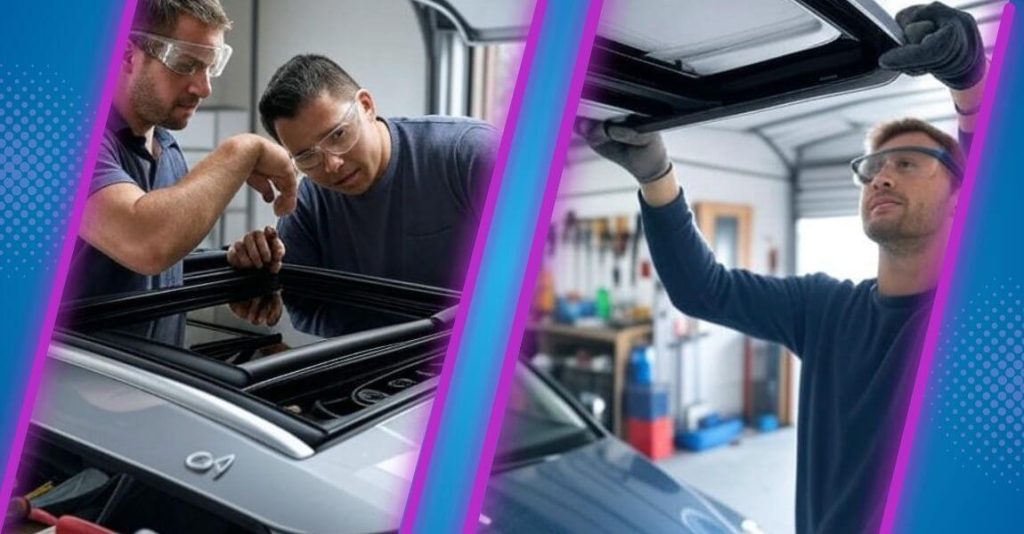
Contents
Understanding the Causes of a Leaking Sunroof
Imagine the sinking feeling when you spot a damp patch on your car’s floorboard after a rainstorm—it’s like your car’s crying for help. A leaking sunroof isn’t just annoying; it can wreck your interior if ignored, and I learned this the hard way with my old Tiguan. From clogged drain tubes to worn-out rubber seals, I’ll break down the main culprits behind those pesky leaks, sharing tips I’ve picked up from my own fixes. Let’s dive into why your sunroof might be letting water in and how to spot the problem fast.
Why Does My Sunroof Leak? Common Causes
You know that sinking feeling when you find a puddle on your passenger floorboard—after it rained just once? Yeah, I’ve been there. It’s not magic—it’s your sunroof leaking. And chances are, it’s one of a few usual suspects.
🔁 Clogged Drain Tubes: The Most Common Culprit
Let’s start with the big one: clogged drain tubes . Every sunroof has small drains in each corner that funnel water outside your car. But over time, leaves, dirt, and even pollen build up and clog them like hair in a shower drain. When that happens, water has nowhere to go—so it backs up and leaks into your car.
I had this exact issue with my Tiguan , where the rear drain tubes exit near the wheel well. One fall season was all it took for enough gunk to pile up and send water straight into my back seat. Not fun.
Quick Fix Tip: Grab a shop vacuum and gently suction out the drain holes. If you can blow air through them afterward, you’re golden.
🦥 Worn or Damaged Rubber Seals: When the Weatherstripping Gives Up
Another sneaky cause? Your sunroof seal is tired. That rubber strip around the edge keeps water out by forming a tight barrier between the glass and your roof. But like any rubber part, it dries out, cracks, or gets misshapen over time.
I noticed mine wasn’t sealing right after a long winter. The rubber looked fine at first glance—but once I ran my finger along the sunroof trough , I felt little gaps letting water sneak through.
Pro Tip: Inspect your weatherstrip regularly. If it feels brittle or doesn’t spring back when pressed, it’s time to replace it.
🌀 Improper Glass Sealing: Misalignment Can Be Sneaky
Sometimes, the glass itself isn’t seating properly against the body. This can happen after repairs, accidents, or just regular wear and tear. If the sunroof tilts or shifts slightly, it creates tiny gaps that let water drip in.
This one’s trickier to spot without lifting panels or checking movement manually—but if your sunroof closes with a “thunk” instead of a smooth press, something might be off.
What to Do: Check how the glass presses down when closed. If it doesn’t feel snug all the way around, consider having it realigned.
🤖 Panoramic Sunroof Motor Issues: Hidden Problems in Fancy Roofs
If you’ve got a panoramic sunroof , things get a bit more complex. These roofs use motors and tracks to open and close—and sometimes, the motor fails or miscommunicates with the system. That can leave the sunroof ever-so-slightly ajar, creating a perfect leak point.
I helped a buddy with his panoramic roof recently. Turned out, the motor thought the roof was fully closed when it wasn’t. A quick reset and recalibration fixed it—no parts needed.
Key Insight: If your panoramic roof acts weird—like it won’t close all the way or makes strange noises—get it checked early.
🕰️ Age and Wear — The Slow Fade
Like any part of your car, sunroofs age. Seals dry out. Tracks rust. Drains slow down. It’s not always one big issue—it could just be years of wear and tear catching up.
Quick Answer: Over time, normal wear can make your sunroof more prone to leaks—even if nothing seems broken.
I’ve seen this in older cars where nothing is catastrophically wrong—but enough little things add up to a soggy ride.
📌 Real-Life Example: How I Found My Leak
Back when I first noticed a wet spot on my floor mat, I assumed the worst. Turns out, it was just a clogged drain tube hiding under a layer of dust. After cleaning it out with a pipe cleaner and a vacuum, the leak stopped instantly.
The lesson? Don’t panic yet. Most sunroof leaks have simple fixes—if you know where to look.
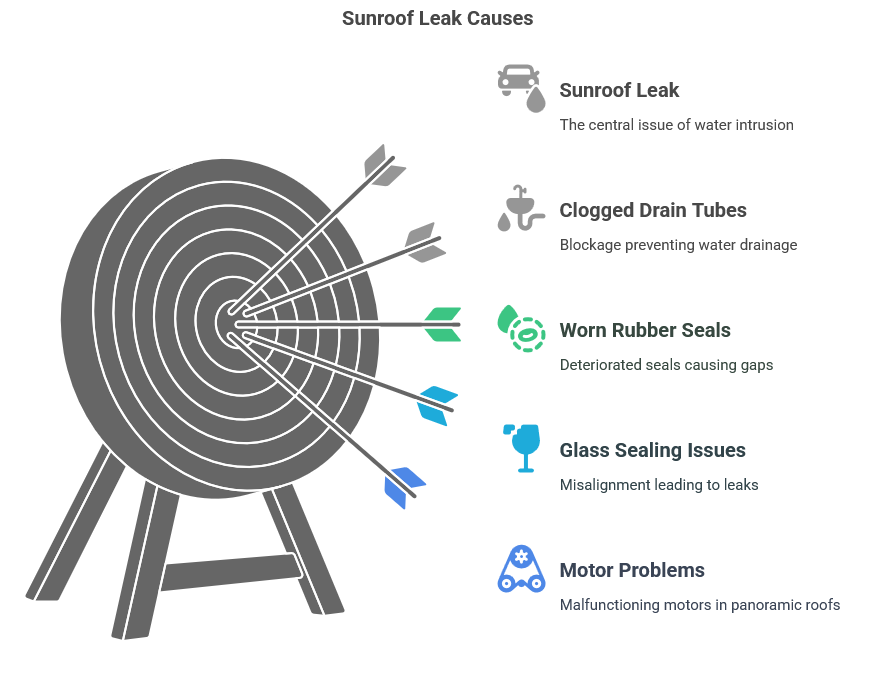
Tools and Materials You’ll Need (So You Don’t End Up Like Me—Dripping and Confused)
Before I dive into how to fix a leaking sunroof, let’s talk tools. Trust me—you don’t want to start this job only to realize you’re missing something small but crucial. I’ve been there, mid-job, realizing my silicone sealer had dried up in the garage like an old ketchup bottle.
Let me save you the hassle. Here’s what you really need—and why.
🧽 DIY Tools — The Essentials for Unclogging and Sealing
First off, grab a shop vacuum . Yep, that thing collecting dust in your garage? It’s gold here. Use it to suck out debris from those clogged sunroof drain tubes before they turn your car into a pool.
Quick Tip: A shop vacuum is one of the easiest ways to clear clogged drain tubes without tearing anything apart.
Next, get a sunroof drain cleaning tool . You can use a flexible wire cable or even compressed air if you’re feeling fancy. Some folks go full MacGyver with a pipe cleaner and a twist-tie—guilty as charged.
And then there’s silicone sealant . If you’re going for a quick redneck fix, black silicone works just fine. But if you care about looks, go with clear. Either way, make sure it’s automotive-safe .
Quick Answer: Black silicone sealer = fast fix. Clear = cleaner look. Both stop leaks.
Oh, and don’t forget sunroof seal tape —a lifesaver for temporary fixes when you’re not ready to replace the whole rubber seal.
🔍 Inspection Tools — So You Don’t Miss Anything Important
You’ll also want a flashlight . Those sunroof troughs and drain holes are dark little caves full of surprises—leaves, dirt, maybe even a spider condo.
I once spent 10 minutes trying to unclog a drain, only to find out the hole was blocked by a walnut-sized clump of gunk. Flashlight helped me see it wasn’t just “magic leak juice.”
If you’re working on a panoramic sunroof or aren’t familiar with your model, pull up a parts diagram online or check your car manual. It’ll show you where everything lives under the trim and panels.
Pro Insight: Knowing where your drain exits are located (like on a Tiguan) saves hours of frustration.
🛡️ Safety Gear — Because No One Wants Chemical Tears
This isn’t optional: grab some gloves and eye protection . Sealants can sting if they get in your eyes, and nobody wants that kind of drama.
Also, be careful with fumes. Silicone sealant smells like regret in a tube. Work in a well-ventilated area or open your garage door wide—unless you enjoy seeing stars after sniffing chemicals.
Quick Warning: Always wear gloves and eye protection when applying silicone sealant.
And there you have it—the full list of what you’ll need to tackle a leaky sunroof like a pro, minus the panic.
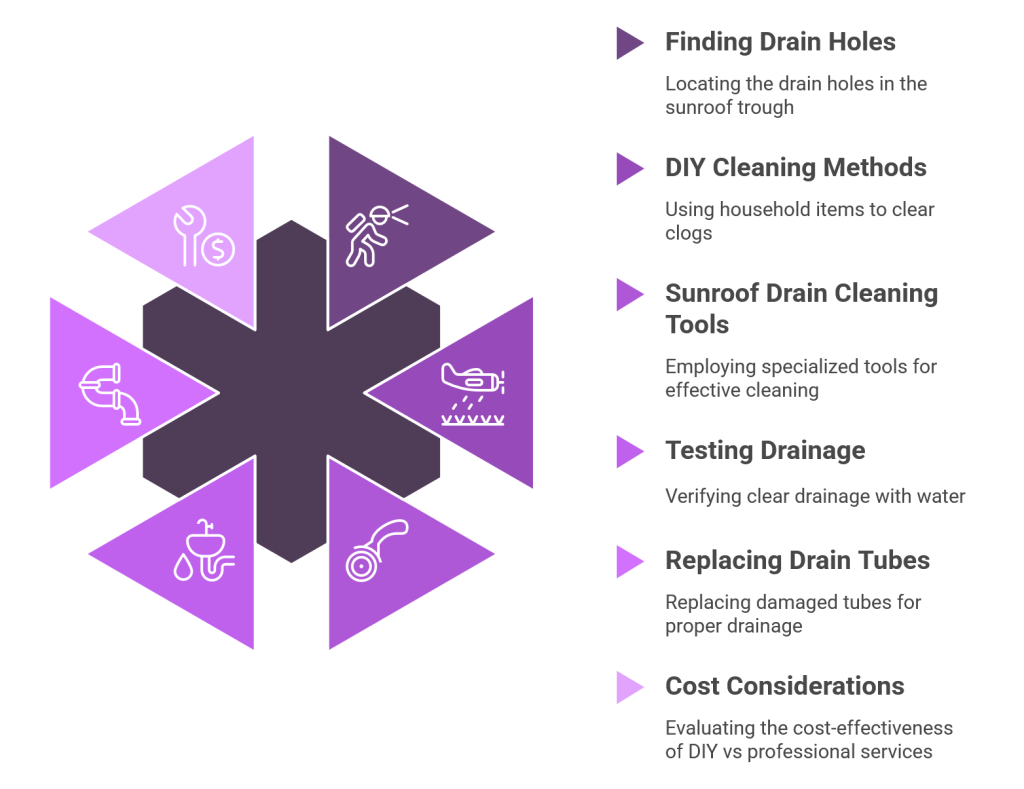
Step-by-Step Guide to Fixing a Leaking Sunroof (Without Losing Your Mind)
Let’s get real for a second—fixing a leaky sunroof sounds like a pain. But once you break it down step by step, it’s totally doable. I’ve done this more times than I’d like to admit (thanks, Oregon rain), and I promise, with the right moves, you can fix yours without even needing to call a pro.
Let’s walk through it together.
🚫 Step 1: Inspect the Drain Tubes — Where Most Leaks Start
Your sunroof is supposed to let water in—but only so it can drain out through hidden tubes. When those drain tubes clog , that’s when things go wrong.
Quick Answer: Most sunroof leaks start with clogged drain tubes. Clear them first before jumping to bigger fixes.
Start by locating the sunroof trough —that’s the little channel just inside the rubber seal. Shine a flashlight in there and look for gunk. Then check where the drain tubes exit your car—on some models like the Tiguan , they come out near the wheel wells.
Use a shop vacuum or a flexible cleaning tool to suck or push out debris. Once clear, pour a little water over the sunroof to test the flow. If it drains fast, you’re golden.
🦥 Step 2: Check the Rubber Seal — The Unsung Hero
Even if your drains are clean, a cracked or dried-out rubber seal can still be the problem. This is what actually keeps water from sneaking past the glass.
Quick Answer: A worn rubber seal can cause a leak even if your drains are working fine.
Run your fingers along the edge of the seal. If it feels brittle, cracked, or doesn’t bounce back when pressed—it’s toast. Replace it using a parts diagram for your model (I always pull mine up on Google). Don’t forget to wipe out the trough with mild soap and water before installing the new one.
💧 Step 3: Apply a Temporary or Permanent Seal — Fast Fixes Work
If you’re not ready to replace the whole seal, try a sunroof seal tape . It’s like a Band-Aid for your roof—stick it over the gap and ride dry until you’re ready for the full fix.
For a longer-term solution, silicone sealant works wonders. I once used black silicone sealer on a road trip because I didn’t have time for anything fancy. Yeah, it looked like a redneck fix—but guess what? It worked for months.
Quick Tip: Black silicone is messy but effective. Clear dries invisibly and looks cleaner long-term.
Just make sure to apply it evenly around the edges and give it at least 24 hours to cure.
🔁 Step 4: Make Sure the Glass Seals Tightly — Alignment Matters
This one’s easy to overlook. Even with perfect drains and a fresh seal, if the glass isn’t closing flush with the roof, water will sneak in.
Quick Answer: Misaligned glass can cause leaks even if everything else looks good.
Press down gently when closing the sunroof. Does it feel snug all the way around? If not, you may need to adjust the motor or track alignment—especially on panoramic sunroofs .
And yes, I’ve poured water over my own sunroof while parked in the driveway. Sounds weird, but it’s the best way to see if your fix worked. Just keep a towel handy.
⚙️ Step 5: Panoramic Sunroof Motor Issues — When It Gets Tricky
If you’ve got a panoramic sunroof and it’s not sealing right, the issue might be mechanical. These roofs use motors and tracks, and sometimes the system gets confused or misaligned.
Quick Warning: Panoramic sunroof motor issues often require professional help.
I had one that closed unevenly—and after checking everything else, it turned out the motor needed recalibration. Took me two hours to figure out, and five minutes for a mechanic to fix.
So if your sunroof acts “off” and you’ve ruled out everything else, don’t waste hours trying to fix what needs a pro.
⚠️ Safety Note: Always Play It Safe
Before messing with electrical parts like the motor, disconnect the car battery . No sense in risking a short or shock just to save a few bucks.
Also, wear gloves and eye protection when applying sealants. Trust me, silicone in your eye? Not fun.
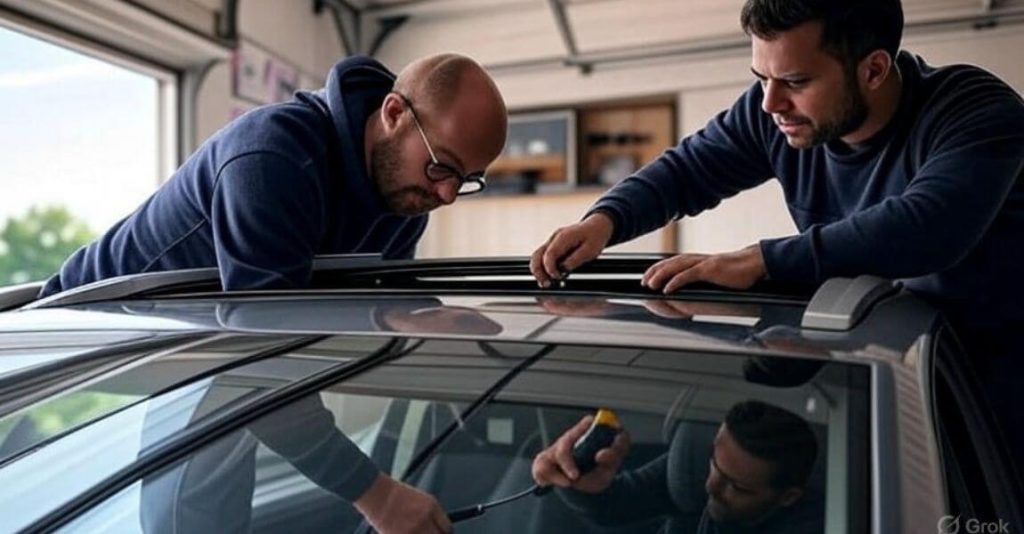
Clearing Sunroof Drainage Channels
Ever had that moment when you hear a slosh in your car and realize your sunroof’s turned into a sneaky water trap? I sure did with my old Tiguan, and let me tell you, unclogging those drainage channels was a game-changer. Clearing sunroof drainage channels is like giving your car a good spring cleaning—it’s simple, saves your interior, and feels downright satisfying. Here’s how I tackled those pesky clogs with DIY tricks, so you can keep your ride dry and drama-free.
Finding the Drain Holes
First things first, you’ve got to find those sneaky sunroof drain holes—they’re usually tucked in the corners of the sunroof trough, just inside the rubber seal. In my Tiguan, I traced the drain tube exits to the wheel wells, but your car’s manual or a quick online parts diagram can point you to the right spots. Not knowing where to start is half the battle, so grab a flashlight and hunt them down. Short answer: Sunroof drain holes are typically in the trough corners, with exits near wheel wells or under the car.
DIY Cleaning Methods
Cleaning those drains is like clearing a clogged sink—you just need the right tools to break through the gunk. I’ve used a weedeater string to snake through the tubes, gently pushing out leaves and dirt, or a compressed air hose for a quick blast. Some folks swear by mixing salt and alcohol to dissolve stubborn buildup before flushing with water—worked for a friend’s SUV! Short answer: Use weedeater string, compressed air, or salt and alcohol to clear clogged sunroof drains.
Using Sunroof Drain Cleaning Tools
For a pro-level clean, grab a sunroof drain cleaning tool, like a flexible cable, or an air gun nozzle from an auto parts store. I once borrowed a drain cleaning kit from a buddy, and it made short work of a nasty clog. These tools are designed to slide into the drain tubes without damaging them, so you can clear blockages in minutes. Short answer: A sunroof drain cleaning tool or air gun nozzle clears clogs quickly and safely.
Testing the Drainage
Once you’ve cleared the tubes, test them like you’re checking a straw—pour a little water into the trough and watch it flow out the exits. I learned the hard way to keep a towel inside the car, just in case! If water doesn’t drain smoothly, you might need to repeat the process or check for a cracked tube. Short answer: Pour water into the sunroof trough to test if the drain tubes are clear.
When to Replace Drain Tubes
Sometimes, a tube’s too far gone—cracked or disconnected—and cleaning won’t cut it. I had to replace a drain tube on my car after a clog kept coming back; a parts diagram helped me find the right fit. If you’re not comfy with this, a pro can handle sunroof drain tube replacement for you. Short answer: Replace cracked or disconnected sunroof drain tubes if cleaning doesn’t fix the leak.
Cost Considerations
Wondering if it’s worth the DIY effort? Clearing drains at home costs next to nothing—maybe $10 for a cleaning tool or sealant—while a shop might charge $100-$300 to unclog or replace tubes. I saved a bundle doing it myself, but for tricky cases, check with a local auto shop for quotes. Short answer: DIY sunroof drain cleaning costs under $20, but professional fixes can run $100-$300.
When to Call a Professional (Because Sometimes You Just Need Backup)
Let me tell you something real—sometimes, no matter how hard you try, the leak just won’t quit. I once spent an entire Saturday cleaning drains, sealing cracks, and rechecking everything… only to find another drip the next morning. That’s when I knew it was time to call in the pros.
Here’s how to know when it’s worth the cost—and when you’re better off saving your energy (and sanity).
❌ Signs You Need Help — Don’t Keep Fighting It
If you’ve tried DIY fixes like unclogging drain tubes or applying silicone sealer and the leak keeps coming back, it’s not you—it’s the problem.
Quick Answer: If water still leaks after DIY repairs, it’s time to see a pro.
Some issues are just too complex for home fixes. Things like panoramic sunroof motor failure , misaligned tracks, or deep water damage in the floorboard require tools and expertise most of us don’t have lying around.
I had a friend who kept trying to “massage” his panoramic roof into sealing right—until he realized the motor had glitched and wasn’t closing fully. A quick diagnostic at a shop saved him hours of frustration.
🛍️ Who Repairs Leaking Sunroofs — And How to Find Them
So where do you go when you’re out of options?
Start with auto glass shops , dealerships , or specialized car repair services that focus on weather seals and drainage systems. Not all mechanics handle sunroof details, so be specific.
Quick Tip: Search for local shops in the USA that specialize in sunroof repairs. Yelp and Google Reviews are gold here.
I found mine through a 5-star review from someone with the exact same car model and issue. Turns out, they even had a parts diagram ready for my seal replacement.
💰 Sunroof Leak Repair Cost — What to Expect
Now, let’s talk money. Costs vary depending on what’s wrong, but here’s a rough idea:
- Drain tube cleaning or seal replacement : $100–$300
- Motor or track work (especially panoramic roofs) : $400–$800+
Quick Insight: Most basic sunroof repairs fall between $100 and $500. Complex jobs can run higher.
I once fixed a clogged drain for under $150—but later paid over $600 to recalibrate a panoramic motor. Worth it? Absolutely. My car stayed dry, and my peace of mind was priceless.
🧠 Personal Insight — When I Chose Pro Over DIY
There was one time I almost went broke trying to fix a leak myself. I bought every tool, watched every YouTube video, and still couldn’t stop the drip.
Finally, I bit the bullet and took it in. Turned out, the frame was slightly bent from a past repair. No amount of sealant was going to fix that.
Lesson Learned: Sometimes paying a pro saves more than just time—it prevents bigger problems down the road.
So if you’re tired of guessing, don’t feel bad. There’s no shame in calling in a specialist. We all need help sometimes—even gearheads like me.
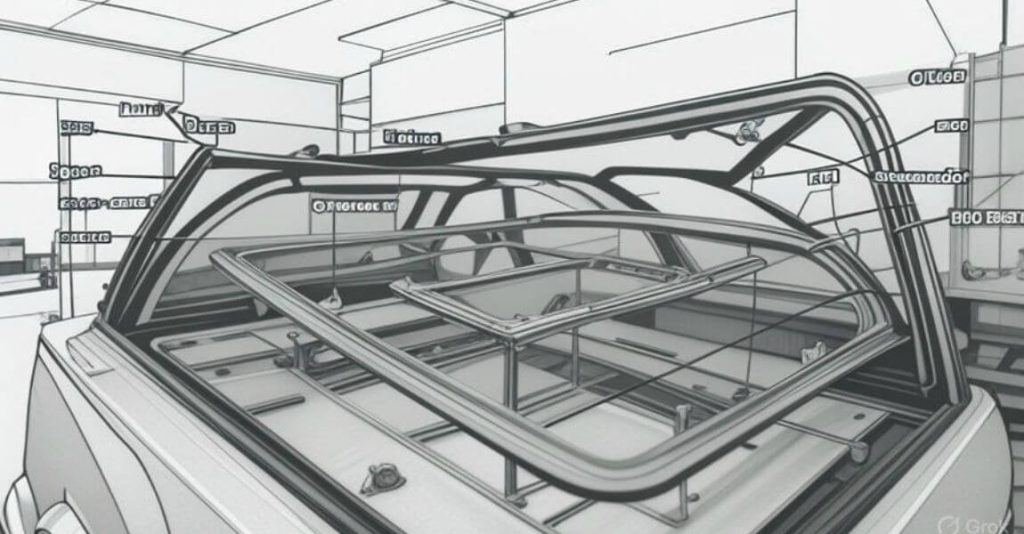
Preventative Maintenance to Avoid Future Leaks (Because Nobody Likes Wet Seats)
Let me tell you something I learned the hard way—waiting until your floorboard is soaked is not the best time to think about sunroof maintenance. Trust me, a little care now can save you a lot of headaches later.
I used to ignore my sunroof between leaks. Big mistake. After three rounds of fixes in one year, I realized I needed a plan—not just for fixing leaks, but for avoiding them altogether .
🧹 Regular Cleaning — Keep Those Drains Flowing
Just like gutters on a house, your sunroof drain tubes need regular cleaning. Every six months, give them a quick once-over with a shop vacuum or a blast of compressed air.
Quick Tip: Clean your sunroof trough and drain tubes twice a year to avoid clogs that cause leaks.
I started doing this after noticing water pooling longer than it should during rain. Turns out, a few minutes with the vacuum saved me from another leaky panic session.
If you’re feeling fancy, use a soft brush or pipe cleaner to gently remove any stubborn bits stuck inside.
🦥 Seal Inspections — Don’t Let Rubber Rot
Your sunroof rubber seal is like a superhero cape—it’s what keeps water from sneaking into your ride. But even superheroes get tired.
Quick Insight: Check your rubber seal at least once a year for cracks or dryness.
Rub your fingers along the edge. If it feels stiff or doesn’t bounce back when pressed, it’s worn out. Also, try applying a silicone-based protectant every so often. It keeps the rubber soft and helps it last longer.
I used to skip this step—until I noticed tiny gaps letting in water. Now I treat my seals like I do my skin: moisturize regularly, avoid cracks.
💧 Monitor Drainage — Test Before You’re Soaked
You don’t have to wait for a storm to know if your drains are working. Grab a cup of water and pour it slowly over the sunroof while parked indoors.
Quick Test: Pour water over the sunroof to see if it drains fast—no leaks = good to go.
If it backs up or drips inside, you’ve got an issue before it even rains. That’s the kind of early warning system you want.
This trick has saved me more than once. One test showed a slow drain—and I caught it before it turned into a full-blown leak.
📂 Keep a Parts Diagram Handy — Knowledge Is Power
Every car model hides its drain tube locations differently. Some exit near the wheel well, others run under panels. Knowing where yours live makes cleaning and checking easier.
Pro Tip: Save or print a parts diagram for your specific car model—it’s a life-saver for future fixes.
I keep mine tucked in my glovebox. Sounds weird, maybe—but next time I’m troubleshooting a drip, I won’t waste time guessing where things go.
Special Considerations: Tiguan, Panoramic, and Moon Roofs (Because Not All Sunroofs Are Created Equal)
If you’ve ever owned a Tiguan , driven a panoramic sunroof , or rolled with a classic moon roof , you already know—they don’t all leak the same way. Each type has its own quirks when it comes to drains, seals, and sneaky water tricks.
I’ve had my fair share of run-ins with these different roofs, and trust me—knowing how yours works can save you from a soggy surprise on your morning commute.
🛢️ Tiguan Sunroof Drain Exit Location — Where the Water Goes
Volkswagen Tiguans are great cars—but their sunroof drain tubes ? Tricky little devils. The rear ones often exit near the rear wheel wells , which makes them easy to miss during cleaning.
Quick Tip: On a Tiguan, check near the rear wheel wells for drain tube exits—common spots for clogs to hide.
One time, I spent 20 minutes blowing air through the front drains, only to realize the real issue was hiding behind the back tire. After clearing that one out, no more leaks.
So if you’re troubleshooting a Tiguan sunroof leak , pull up a parts diagram and look closely at those rear exits. You’ll thank yourself later.
🌀 Standard vs. Panoramic Sunroofs — More Glass, More (Potential) Trouble
A standard sunroof is like a small window—simple, predictable. But a panoramic sunroof ? That’s like turning your whole roof into glass—and with that luxury comes extra complexity.
Quick Insight: Panoramic sunroofs have more drains and moving parts, making them more prone to leaks.
They have multiple drain points , wider seals, and—most importantly—motors that control movement. If that motor acts up or the track gets misaligned, even slightly, you’ll get leaks no matter how clean your drains are.
I once had a panoramic roof that looked closed but wasn’t sealing right. Turns out, the motor needed recalibration. A five-minute fix saved me hours of frustration.
🌙 How to Access and Clean Moon Roof Drain Tubes — Hidden but Important
Moon roofs might be smaller than panoramic ones, but they still rely on those tiny drain tubes to keep water flowing out—not into your car.
Quick Fix: Locate moon roof drain tubes by checking under trim panels or along door seams—use a shop vacuum or flexible tool to clear debris.
On mine, the drains were tucked under interior headliner panels. At first, I didn’t even know where to start cleaning—until I pulled up a parts diagram and found the hidden access points.
Once you find them, cleaning is pretty straightforward. Just be gentle—you don’t want to rip any interior trim trying to save your floorboards.
⚙️ Checking the Panoramic Sunroof Motor — When It’s Not Closing Right
If your panoramic roof feels “off” when closing—or worse, leaves a gap—you might have a motor or alignment issue .
Quick Warning: If water pools around your panoramic sunroof, check the motor—it may not be closing fully.
I had this problem after a software update messed with my roof’s settings. The motor thought the roof was closed when it really wasn’t. A quick reset fixed everything.
If you’re not tech-savvy, this is a good time to see a pro. These motors are sensitive, and messing with them blindly can cause more harm than good.
Who Repairs Leaking Sunroofs? When to Go Pro (And How to Choose the Right Shop)
There comes a time when even the most die-hard DIYers have to admit defeat. I’ve been there—arms deep in gunk, flashlight clenched between my teeth, muttering “just one more try”—only to realize I was wasting time and energy.
If you’re stuck with a stubborn leak or dealing with something like a panoramic sunroof motor issue, it might be time to hand the reins over to someone who does this for a living.
🏢 Dealerships vs. Independent Auto Body Shops — Weighing Your Options
When it comes to fixing a leaking sunroof, you’ve got two main paths: dealerships or independent auto body shops .
Quick Insight: Dealerships offer factory-trained service but often at a higher cost; independent shops can be more affordable but vary in expertise.
I once took my car to a dealership because I thought only they could handle a complex seal job. Turns out, an independent shop down the street did the same fix for half the price—and faster too.
If your car is still under warranty, though, the dealership might be your safest bet. More on that in a sec.
❓ What to Ask Before Booking Service — Don’t Just Drop It Off
Before handing over your keys, ask a few key questions:
Quick Tip: Always ask if they’ve worked on your specific model before—experience matters.
Some good ones to throw their way:
- “Have you fixed sunroof leaks on this make/model before?”
- “Can you show me where the leak is coming from?”
- “Is this covered under warranty?”
I once asked a mechanic if he’d dealt with panoramic sunroofs—he paused, then admitted he mostly worked on bumpers. Saved myself a headache by going elsewhere.
📄 Warranty Implications — Don’t Void It by Accident
If your car is newer and still under warranty, be careful where you go.
Quick Warning: Some warranties require repairs to be done at dealerships or authorized shops to stay valid.
I learned this the hard way after getting a sunroof motor replaced at an indie shop—turns out, the repair wasn’t approved by the manufacturer, and I lost part of my powertrain coverage.
So if you’re unsure, check your warranty booklet or call the dealership first. It might save you a lot of grief later.
FAQs for Fixing a Leaking Sunroof
How do I fix a leaky sunroof at home?
Use a shop vacuum or compressed air to clear clogged drain tubes. Replace worn rubber seals or apply silicone sealer. For fast fixes, use sunroof seal tape until you can do more.
What causes a clogged sunroof drain?
Debris like leaves, dirt, and pollen build up in the drain tubes over time. This stops water from draining properly and leads to leaks inside your car.
Can I use sunroof seal tape for a permanent fix?
Sunroof seal tape works well as a temporary patch but isn’t meant for long-term use. It’s best used until you can replace the rubber seal or apply silicone for a lasting repair.
How much does it cost to repair a leaking sunroof?
DIY fixes cost $10–$50. Pro repairs range from $100–$500, depending on the issue. Replacing tubes or motors may cost more due to labor and parts.
Is a moon roof the same as a sunroof?
A moon roof is a type of sunroof made mostly of glass that tilts open. A standard sunroof slides or pops open. Both can leak due to clogged drains or worn seals.
Final Thoughts – Don’t Let a Leak Ruin Your Ride
If you’re someone who values staying dry on the road and doesn’t want a puddle in your passenger seat, learning how to fix a leaking sunroof can save you time, money, and stress. But if you’re not into hands-on fixes or your car has deeper issues like a faulty panoramic motor, it might be worth seeing a pro.
I used to ignore my sunroof until it was too late—big mistake. Once I started cleaning drains and checking seals regularly, I avoided costly repairs and kept my car feeling fresh.
